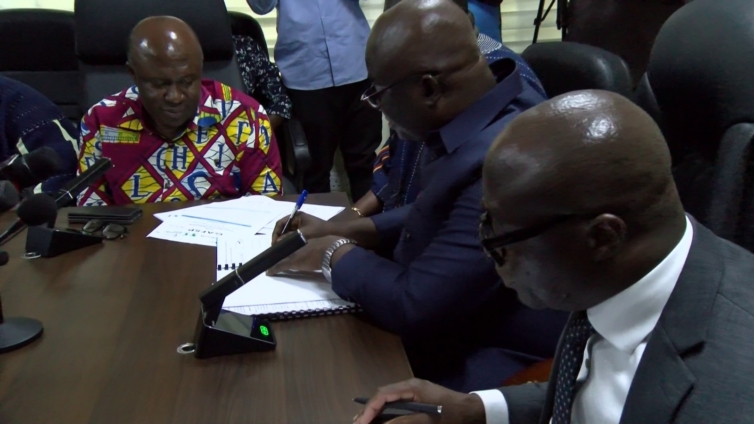
In a strategic move to strengthen food production and empower women in agriculture, the Minister for Food and Agriculture, Dr. Eric Opoku, has signed a $1 million funding agreement. This ambitious initiative, targeting the five northern regions and Oti, aims to enhance resilience in Ghana’s agricultural sector following a difficult farming season marked by prolonged drought.
The agreement, brokered between the government and the Association of Rural Banks Apex Bank (ARB Apex Bank), seeks to equip women farmers with the necessary tools and resources to thrive. Dr. Opoku emphasized that the project’s primary focus is on irrigation systems, agricultural tools, and tailored financial support, ensuring women are at the heart of the agricultural transformation.
“This project is a targeted intervention to fund irrigation systems and other critical implements, particularly for women farmers in the five northern regions and Oti,” Dr. Opoku stated during the signing ceremony.
Building Resilience in Northern Ghana
Funded by the Global Agriculture and Food Security Programme (GAFSP), the initiative represents a significant investment of 20 million cedis aimed at transforming the northern savannah ecological zone into a hub for sustainable food and nutrition security. Dr. Opoku extended his gratitude to GAFSP, as well as the African Development Bank, for their unwavering support and technical guidance in designing and mobilizing the project.
Initially rolled out across 12 districts in six regions, the project will focus on achieving measurable impacts by concentrating resources on fewer communities. This approach aligns with lessons learned from the successful Savannah Investment Programme, which demonstrated the importance of scaling up proven interventions for greater reach and effectiveness.
Empowering Women and Youth in Agriculture
The project’s core objectives include raising farmers’ incomes, improving household nutrition, and empowering women-headed households. Recognizing the vulnerability of women and youth in agricultural communities, the initiative will prioritize their needs through climate-smart solutions and targeted financial support.
Key interventions include:
Provision of Inputs and Mechanization: Access to improved seeds and fertilizers for staple crops such as maize, rice, soybean, cowpea, and groundnuts, alongside handheld agricultural tools tailored to smallholder farmers.
Solar-Powered Irrigation: Deployment of solar-powered micro-irrigation kits to boost dry-season vegetable production.
Poultry Farming Support: Assistance for households to engage in poultry farming, ensuring access to affordable and nutritious protein sources.
Revolving Fund to Support Women-Led Agribusinesses
At the heart of the initiative is a $1 million revolving fund, managed by ARB Apex Bank. Designed to offer low-interest loans at just 10 percent with flexible repayment terms, the fund will empower smallholder farmers, women’s groups, and agribusinesses to expand their operations.
Dr. Opoku highlighted the strategic selection of ARB Apex Bank due to its extensive network of rural and community banks, which are deeply embedded in the project’s operational areas. “This structure provides the best potential for reaching our target beneficiaries at the grassroots level,” he explained.
The revolving fund will focus on supporting women engaged in vegetable farming and cultivating crops such as groundnuts, cowpea, and soybean. Additionally, agribusinesses along the agricultural value chain will benefit from enhanced financial resilience and operational capacity.
A Commitment to Transparency and Sustainability
Dr. Opoku underscored the importance of responsible fund management, urging stakeholders to ensure the sustainable use of resources. “The true impact of this fund will depend on how effectively and responsibly it is managed and disbursed,” he noted.
The initiative also aligns with the government’s broader Agriculture for Economic Transformation Agenda (AETA) and the Feed Ghana programme. Together, these efforts form a cohesive strategy to build an inclusive, sustainable, and resilient food system capable of transforming communities nationwide.
A Call for Continued Collaboration
Dr. Opoku concluded by acknowledging the invaluable contributions of development partners, including GAFSP and the African Development Bank. He called for ongoing collaboration to sustain progress and improve Ghana’s agricultural landscape.
“I wish to once again thank all our development partners for their steadfast support,” he said. “Let us continue to work hand in hand to create a thriving agricultural sector that empowers our people and secures our nation’s future.”
Story by: Mercy Addai Turkson #ahotoronline.com




